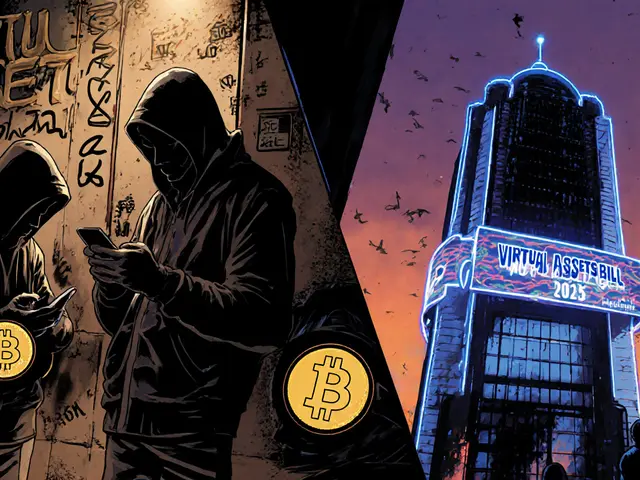- Home
- Cryptocurrency
- Pakistan Crypto Regulation 2025: From Ban to Legalization

Pakistan Crypto Regulation 2025: From Ban to Legalization
Pakistan Crypto Regulation 2025: Compliance Checker
Legal to Hold
You can own and transfer cryptocurrencies like Bitcoin and Ethereum under the new law.
Retail Payments Banned
Crypto cannot be used for everyday purchases at stores or online.
Check Your Compliance Status
Important Notes
- All crypto activities must go through a licensed Virtual Asset Service Provider (VASP)
- AML/CTF compliance is mandatory for all VASPs
- Retail payments with crypto are strictly prohibited
- The Digital Pakistani Rupee (DPKR) will be used for daily transactions
- Tax reporting will be required for crypto gains
For years the crypto community in Pakistan operated in a legal gray zone, dodging bank bans and fearing sudden crackdowns. In September 2025 the country took a dramatic turn, moving from a strict prohibition to a structured legalization framework. That pivot reshapes everything from how investors hold Bitcoin to how the State Bank plans to launch a sovereign digital rupee.
Key Takeaways
- The Virtual Assets Bill 2025 legalizes holding and transferring cryptocurrencies under a new regulator, PVARA.
- Retail payments with Bitcoin or Ethereum remain banned; the focus is on remittances and fintech pilots.
- Pakistan will launch a state‑controlled Digital Pakistani Rupee (CBDC) alongside the new crypto framework.
- Strict AML/CTF rules, licensing for VASPs, and a dedicated crypto council aim to bring the $21billion underground market into the formal economy.
- Future expansions may loosen restrictions, but state oversight will stay tight for the foreseeable future.
What the Virtual Assets Bill 2025 Actually Does
Virtual Assets Bill 2025 is a law enacted by President Asif Ali Zardari on July82025 that creates a comprehensive legal framework for digital assets in Pakistan. It does three things:
- Declares that crypto‑tokens can be owned and transferred by individuals and businesses.
- Sets up the Pakistan Virtual Asset Regulatory Authority (PVARA) as the sole licensing and supervisory body.
- Mandates AML, counter‑terrorism financing (CTF), data‑privacy, and fraud‑prevention measures for every virtual asset service provider (VASP).
The bill explicitly stops short of allowing crypto as a medium of payment at brick‑and‑mortar stores. That line draws a clear boundary between “legal to hold” and “illegal to spend,” a compromise meant to appease both the banking sector and the tech community.
The New Regulator: PVARA
PVARA (Pakistan Virtual Asset Regulatory Authority) is an autonomous agency reporting to a technical committee that includes the Finance Minister, the State Bank of Pakistan (SBP), the Securities and Exchange Commission of Pakistan (SECP), and the ministries of Law and IT. Its first tasks are:
- Issue licenses to crypto exchanges, custodians, and wallet providers.
- Deploy a KYC/AML platform that cross‑checks users against national ID databases.
- Run compliance audits and impose fines for violations.
- Educate banks and fintech firms on integrating crypto‑friendly services.
Because PVARA will be staffed by digital‑finance experts, the authority is expected to keep pace with fast‑moving global standards while tailoring rules to Pakistan’s unique economic challenges.
How the State Bank of Pakistan is Shifting Its Stance
Back in 2018 the SBP issued an advisory that prohibited banks from dealing with cryptocurrencies. In September 2025 Acting Deputy Governor Dr. Inayat Hussain announced that the SBP would withdraw the advisory once the Virtual Assets Bill was fully operational. The bank’s new role includes:
- Overseeing the licensing of VASPs that wish to partner with regulated banks.
- Providing a sandbox for fintech pilots that use crypto for cross‑border remittances.
- Co‑developing the Digital Pakistani Rupee (DPKR) with the help of international CBDC experts.
While the SBP still blocks crypto‑based merchant payments, it now recognizes crypto as a legitimate asset class that can be reported on balance sheets, opening the door for institutional participation.
Digital Pakistani Rupee: The State‑Controlled CBDC
The government announced a parallel initiative: a Central Bank Digital Currency dubbed the Digital Pakistani Rupee (DPKR). Unlike decentralized tokens, the DPKR will be issued and settled through the SBP’s core banking infrastructure. Key characteristics include:
- Native integration with existing bank accounts and mobile money platforms.
- Programmable features that could support conditional subsidies or tax incentives.
- Full audit trails to satisfy AML/CTF requirements.
The pilot, slated for early 2026, will start with a limited group of merchants and overseas workers sending remittances. By pairing a regulated crypto market with a sovereign CBDC, Pakistan hopes to modernize payments without surrendering monetary policy control.

Comparison with Other Countries' Crypto Approaches
| Country | Legal Status of Crypto | Key Restrictions | CBDC Plan |
|---|---|---|---|
| Pakistan | Legal to hold/transfer, banned for retail payments | Licensing required, AML/CTF strict, no merchant use | Digital Pakistani Rupee (pilot 2026) |
| ElSalvador | Bitcoin legal tender | Limited consumer protection, tax on crypto gains | None (focus on Bitcoin) |
| UnitedStates | Legal, regulated by SEC, CFTC, FinCEN | State‑by‑state tax rules, licensing varies | Multiple private CBDC pilots, no federal CBDC yet |
| China | Private crypto banned, state‑run digital yuan | Strict crackdown on mining and exchanges | Digital yuan (widely deployed) |
| India | Crypto trading allowed, heavy taxation | No crypto as legal tender, high tax rates | Exploratory CBDC (RBI pilot) |
Pakistan’s model sits between China’s outright ban and the U.S.’s permissive, market‑driven approach. The mix of legalization and tight control aims to capture tax revenue while keeping the central bank’s monetary tools intact.
Impact on the $21Billion Underground Market
Estimates place Pakistan’s unregulated crypto activity at around $21billion. The new framework gives the tax authority a foothold to bring that money into official channels. Expected outcomes include:
- Higher tax compliance and better economic data for policy making.
- Increased foreign direct investment in blockchain startups seeking a regulated sandbox.
- Potential slowdown for illicit activities due to mandatory KYC and transaction monitoring.
However, analysts warn that the retail‑payment ban could keep a segment of the market underground, especially traders looking for quick, low‑cost transfers.
Roadmap for Implementation (2025‑2026)
The transformation won’t happen overnight. A realistic timeline looks like this:
- Q32025: Virtual Assets Bill enacted; PVARA formation begins.
- Q42025: First batch of VASP licenses issued; AML platform tested.
- Q12026: Digital Pakistani Rupee pilot launched with select remittance corridors.
- Q2‑Q42026: Nationwide rollout of DPKR; periodic review of crypto restrictions based on pilot feedback.
Continuous stakeholder consultations are scheduled to refine the rules, especially around future use‑cases like tokenized assets or decentralized finance (DeFi) services.
What Crypto Users Should Do Now
If you’re already holding Bitcoin, Ethereum, or altcoins, the first step is to register with a licensed VASP. You’ll need to submit:
- National ID (CNIC) copy.
- Proof of address (utility bill).
- Source‑of‑funds declaration.
Once verified, you can transfer tokens between personal wallets without fear of criminal prosecution. Just remember you still can’t pay for groceries or ride‑hailing services with those tokens until the law changes.
Potential Pitfalls and Pro‑Tips
Even with legalization, the environment can be tricky. Keep these in mind:
- Watch for compliance costs. Licensed exchanges will charge higher fees to cover AML infrastructure.
- Stay updated on rule changes. The Senate Committee may relax retail‑payment restrictions after the DPKR pilot proves stable.
- Secure your private keys. Government oversight won’t protect you from self‑custody mistakes.
- Consider diversification. With the DPKR offering a stable, state‑backed digital asset, many investors will split exposure between a regulated crypto token and the CBDC.
Future Outlook: From Controlled Market to Regional Hub?
In the next three to five years, Pakistan could evolve in two directions:
- Gradual liberalization. If the CBDC rollout goes smoothly and tax revenues rise, lawmakers may loosen retail‑payment bans, allowing crypto to be used for e‑commerce and peer‑to‑peer services.
- Maintained control. Alternatively, the government could double‑down on a state‑centric model, focusing on remittances and fintech pilots while keeping private tokens in a tightly regulated niche.
Both pathways depend on how well PVARA enforces standards and how foreign investors perceive Pakistan’s regulatory certainty. The country now has a chance to become a South Asian example of a balanced crypto policy-if it can sustain the delicate dance between innovation and oversight.

Frequently Asked Questions
Is owning Bitcoin now legal in Pakistan?
Yes. The Virtual Assets Bill 2025 permits individuals to own, hold, and transfer Bitcoin and other recognized cryptocurrencies, provided they use a licensed VASP.
Can I pay for goods with crypto after the new law?
No. The law explicitly bans the use of crypto for retail payments. Only the future Digital Pakistani Rupee will be accepted for everyday transactions.
What is PVARA and how does it affect me?
PVARA (Pakistan Virtual Asset Regulatory Authority) is the sole licensing body for crypto exchanges, custodians, and wallet providers. It will verify your identity, enforce AML/CTF rules, and grant operating licenses to platforms you might use.
When will the Digital Pakistani Rupee be available?
The pilot is scheduled for early 2026, starting with select remittance corridors and a limited group of merchants. Full rollout could extend into 2027 depending on pilot outcomes.
Do I need to report crypto holdings on my taxes?
Yes. Once the market is regulated, crypto gains are subject to income tax, and transactions will be tracked through licensed VASP reporting.
Cormac Riverton
I'm a blockchain analyst and private investor specializing in cryptocurrencies and equity markets. I research tokenomics, on-chain data, and market microstructure, and advise startups on exchange listings. I also write practical explainers and strategy notes for retail traders and fund teams. My work blends quantitative analysis with clear storytelling to make complex systems understandable.
Popular Articles
22 Comments
Write a comment Cancel reply
About
DEX Maniac is your hub for blockchain knowledge, cryptocurrencies, and global markets. Explore guides on crypto coins, DeFi, and decentralized exchanges with clear, actionable insights. Compare crypto exchanges, track airdrop opportunities, and follow timely market analysis across crypto and stocks. Stay informed with curated news, tools, and insights for smarter decisions.










Oh, absolutely, because when a government decides to toggle crypto from outlaw to "legally tolerated" like it’s a light switch, you know the powers that be are definitely not plotting to control every digital transaction, right? The Virtual Assets Bill 2025 reads like a manifesto from a techno‑utopian think‑tank, promising AML compliance while simultaneously demanding that every Bitcoin holder sign up with a state‑approved VASP – because who doesn’t love a good bureaucratic handshake? And let’s not forget the sparkling promise of the Digital Pakistani Rupee, a CBDC that will allegedly coexist with private crypto, yet is shackled with the same KYC shackles that make you wish you’d stayed in the dark ages. The law’s distinction between "legal to hold" and "illegal to spend" is a masterstroke of confusion, ensuring that the underground market stays muddy while the tax man gets a fresh slice of the pie. Sure, the State Bank of Pakistan is withdrawing its anti‑crypto advisory, but only after a regulator called PVARA, a brand‑new agency staffed by digital finance experts, can stamp their approval on every exchange. You’ll need your CNIC, a utility bill, and a soul‑searching source‑of‑funds declaration before you can even think about moving a satoshi. And don’t get me started on the compliance costs – licensed exchanges will gladly gouge you for the privilege of operating under an ever‑shifting rulebook designed by people who think a "sandbox" is a place to test children’s toys, not a regulatory nightmare. Yet, in the grand scheme, this is all a grand experiment to pull a $21 billion underground economy into the light, which is exactly what you want when you love the smell of freshly‑printed tax reports in the morning. The whole thing feels like a carefully choreographed dance where the government leads, you follow, and the music is an endless loop of "we’re modernizing" while the beat drums on "we’re still in control". In short, if you enjoy being told you’re free while being shackled, congratulations, you’ve just found a new hobby.
Indeed, the delineation between custodial freedom and transactional prohibition reflects a nuanced regulatory philosophy that prioritizes macro‑economic stability while ostensibly fostering innovation.
The shift feels like a tentative handshake between tradition and technology, but I wonder how many will actually cross the bridge.
Hey, it’s a step forward! Register with a VASP and you’ll be good to go – just think of the possibilities for cross‑border remittances.
Wow, the whole thing screams "controlled chaos" – they let you own crypto but not spend it, like a kid with a toy they can’t actually play with.
Don't let the restrictions discourage you; think of it as an invitation to innovate within the legal framework – there are still many avenues to explore.
For newcomers, the key takeaway is that compliance is now mandatory – get your documents ready and choose a reputable VASP.
I appreciate the clarity, though I wish the government would also provide educational resources to help users navigate the new requirements.
Another day, another regulation.
It’s reassuring to see a middle ground, but the retail ban still feels overly restrictive for everyday users.
Totally agree – the ability to hold crypto is great, yet being barred from using it for daily purchases undermines its utility.
lol they say "legal" but you still need a license for everything, k?
From a compliance perspective, the bill is comprehensive, but implementation will be key.
Implementation often lags behind legislation; we should monitor how PVARA enforces these rules in practice.
The balance Pakistan tries to strike is reminiscent of a tightrope walk between embracing tech and preserving sovereign monetary control.
Indeed, the approach mirrors other emerging markets, aiming for controlled integration without relinquishing fiscal authority.
We must acknowledge the moral imperative behind regulating an industry that has, for too long, operated in the shadows, luring vulnerable individuals into speculative bubbles while evading tax obligations and facilitating illicit finance; the government's decision to impose a structured framework signals a necessary evolution toward transparency, accountability, and societal responsibility, yet the partial prohibition on retail usage simultaneously underscores an inherent contradiction that may perpetuate inequities for everyday citizens; thus, while the legislative progress is commendable, it is incumbent upon policymakers to reconcile the tension between fostering innovation and safeguarding the public interest, ensuring that the regulatory apparatus does not become a tool for selective oppression but rather a catalyst for inclusive economic empowerment.
It is essential that the regulatory framework evolves in tandem with technological advancements, maintaining a balance between oversight and freedom.
Cool move, but I bet the next thing they'll ban is tweeting about crypto.
Take heart, folks – progress is often incremental, and this could be a stepping stone toward broader acceptance.
Listen up, everyone! Stop treating this regulation like an optional side quest – you either comply fully or you’ll face the full wrath of the authorities! Get your CNIC, your utility bill, and your source‑of‑funds statement ready right now. No more excuses, no more procrastination! The state has spoken, and it expects total adherence, period! If you think you can dodge the licensing requirements, think again – the penalties are severe and the enforcement is relentless! This is not a suggestion; it’s a mandate! So, get on board, register with a licensed VASP, and start operating within the legal parameters today!!
The so‑called "Virtual Assets Bill" is a classic example of regulatory capture masquerading as modernization; by imposing onerous licensing on VASPs while maintaining a ban on retail usage, the state engineers a controlled ecosystem that extracts rent from legitimate participants and drives illicit actors deeper underground, thereby perpetuating the very financial opacity it claims to eradicate. Moreover, the introduction of a state‑backed CBDC alongside a constrained crypto market creates a dual‑currency hierarchy that favors governmental oversight at the expense of user sovereignty. This policy fusion is less about fostering innovation and more about consolidating fiscal control, ensuring that every transaction, whether on a private blockchain or the digital rupee, ultimately funnels back to the central authority. In effect, the bill marginalizes true decentralization, rebrand‑ing it as a regulated commodity subject to the same bureaucratic shackles that plagued the traditional banking sector.